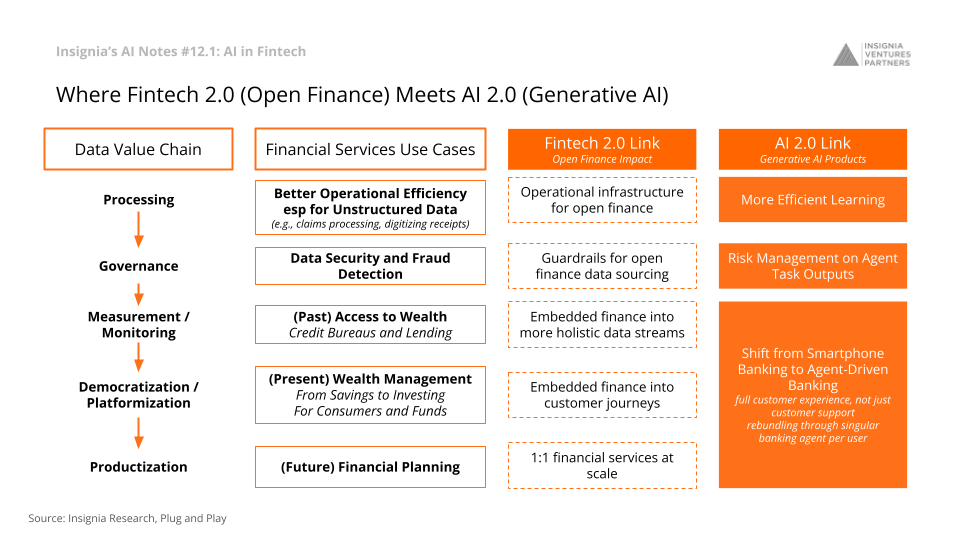As Generative AI (Gen AI) becomes increasingly powerful, its implications for the fintech industry are profound. Capable of analyzing vast amounts of unstructured data, generating realistic simulations, and automating complex financial processes, Gen AI is poised to revolutionize financial services.
While ChatGPT and most open source models can’t be adequately used by financial services providers and institutions, companies like WIZ.AI are already building up enterprise LLMs to meet the needs in terms of accuracy and security of various industries.
Then you have companies like Brankas already pioneering the way open finance is being implemented across fintechs and banks, from both an operational and regulatory perspective.
With open finance and generative AI rapidly emerging as areas for early-stage startup opportunity in Southeast Asia (see the CNBC interview with our founding managing partner Yinglan Tan below), we examine in this article how these two areas intersect and how this impacts AI-driven financial services use cases. We also take insights from this packed Plug and Play compilation article of insights on AI in fintech.

Where Fintech 2.0 (Open Finance) Meets AI 2.0 (Generative AI)
Before Anything Else: Data Processing Layer
Data is the lifeblood of the modern fintech industry. Streamlining data processing is crucial for accelerating the time-to-value of new products and features. Operational infrastructure for open finance aims to create cost and time savings by automating manual collection and cleaning of large datasets. Clare Leighton, COO of data workflow automation company bluesheets, shares on our podcast how customers in the insurance industry like MSIG have seen about 60% in cost savings across hundreds of thousands of claims processed with their AI-driven data processing solutions.
4 Key Use Cases for AI in Fintech
AI for Data Governance: Fraud Detection and Security
AI’s role in data governance and fraud detection has become increasingly critical. Gen AI can identify fraudulent patterns, contribute to real-time monitoring, and adapt to ever-evolving fraud strategies. Startups like Feedzai are making strides in AI-based fraud detection. Coupled with effective data governance practices, AI allows financial institutions to both streamline compliance and minimize risks. Watch in this podcast how data verification solutions Verihubs leverages AI to improve the digital infrastructure of banks and financial institutions.
AI in Consumer Lending and Credit Scoring: A More Equitable Access to Wealth
Traditional credit scoring methods, like FICO scores, are becoming increasingly obsolete. Open banking allows fintech companies to tap into real-time data for better risk assessment. AI-driven platforms like Abound are revolutionizing consumer lending by using more dynamic and personalized data points. AwanTunai CEO Dino Setiawan mentions on our podcast the importance of AI in automating risk management, citing how this is powered by their unique ERP system which captures and validates transactional data for greater accuracy.
AI in Wealth Management and Trading: Democratization and Personalization
AI is redefining how wealth is managed and invested. Tools like Magnifi function as AI co-pilots that guide users through market-moving events, trade stocks, and ETFs. As Huy from Vietnamese investment platform Finhay suggests on our podcast, the AI component can help in improving the smart offerings within their smart investment platform, particularly in decision optimization for retail investors.
AI in Financial Planning: Individualized Services at Scale
The future of financial planning is profoundly personal. AI solutions like WallyGPT serve as all-encompassing personal finance assistants that can manage investments, debts, and even retirement planning. The advent of financial “super apps” powered by AI is an imminent possibility.
What’s Next? The Agent-ization of Banks with AI
The era of smartphone banking is giving way to agent-driven banking, focusing on a full customer experience rather than mere support. Tonik CEO Greg Krasnov talks on our podcast how he envisions a future where natural language dialogues replace cumbersome in-app forms. “It’s going to be by pushing the microphone button and saying, ‘Hey, dude, I need a loan. 5,000 bucks. What do I do?’ And then the app talks back and walks you through the filling out of the application fields,” he said.
AI is no longer a goal but an expectation in the finance industry. From enhanced fraud detection to democratized wealth management, Gen AI promises to transform the way we interact with financial services. As these technologies continue to intersect and evolve, they offer immense opportunities for startups and investors alike in the fintech ecosystem of Southeast Asia and beyond.
Follow our LinkedIn page for the latest updates on our weekly AI insights and other insights in Southeast Asia’s innovation landscape.
Author’s Note: This article was written with insights and research from our investment team. Reach out to them if you’re building in this space out of Southeast Asia and would like a deeper conversation.
Stay tuned for part 2 of AI in fintech!

Follow us on LinkedIn for more AI insights every Wednesday
Paulo Joquiño is a writer and content producer for tech companies, and co-author of the book Navigating ASEANnovation. He is currently Editor of Insignia Business Review, the official publication of Insignia Ventures Partners, and senior content strategist for the venture capital firm, where he started right after graduation. As a university student, he took up multiple work opportunities in content and marketing for startups in Asia. These included interning as an associate at G3 Partners, a Seoul-based marketing agency for tech startups, running tech community engagements at coworking space and business community, ASPACE Philippines, and interning at workspace marketplace FlySpaces. He graduated with a BS Management Engineering at Ateneo de Manila University in 2019.